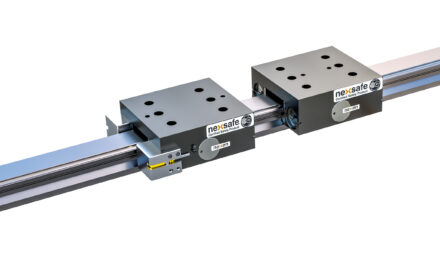Medical and lab equipment use a variety of machine components to achieve precise measuring and handling operations. Shaft couplings, one such component, may be required to provide one-to-one power transmission, highly accurate positioning, and environmental compliance to prevent contamination and handle chemical washdown. Ruland offers rigid and flexible zero-backlash couplings that are designed for use in liquid handling, patient positioning, and surgical systems.
Ruland zero-backlash 4- and 6-beam couplings are machined with multiple spiral cuts for greater torque, torsional stiffness, and parallel misalignment capabilities than commodity style single beam couplings. The more compact 4-beam style beam couplings are ideally suited for encoders and tachometers that have small sensitive bearings which require a coupling that allows for low bearing loads. The 6-beam style has higher torque and torsional stiffness capabilities and is commonly used in light duty applications such as connecting a stepper motor to a lead screw, which is often found in pipetting or other small diagnostic equipment. Aluminum beam couplings are typically the preferred choice due to their low inertia and flexibility. Stainless steel beam couplings are used in higher torque applications. Designers must be careful when specifying a stainless steel option because they have higher inertia and steel screws which are not compatible with corrosive environments.
Ruland jaw couplings are comprised of two lightweight aluminum hubs and a center elastomeric element called a spider. The hubs are machined with a proprietary process to produce a curved jaw profile that press fits with the spider, allowing for zero-backlash operation. The spider dampens impulse loads to minimize shock to the motor and other sensitive system components such as bearings. This is particularly useful in applications with high acceleration/deceleration curves often found in optical inspection and analytical equipment such as chromatographers. The spider is available in three durometers allowing the designer to balance dampening capabilities with torque, misalignment and torsional stiffness based on the needs of the medical system.
Oldham couplings are a three-piece assembly comprised of two anodized aluminum or stainless steel hubs press fit to a center disk. Ruland uses a proprietary hub machining process to ensure smooth interaction between the hub and disk for a long service life and parallel misalignment accommodation of up to 10% of the coupling OD. The press fit between hub and disk ensures zero-backlash operation. Designers can choose between three disk materials to balance torsional rigidity, torque, environmental compliance, and misalignment capabilities. Aluminum hubs are lightweight and cost effective making them ideal for urinalysis and blood analysis equipment that require high misalignment and accuracy capabilities. Stainless hubs with a PEEK disk can be used in corrosive and high temperature environments, which is most useful in systems with strict hygiene requirements such as autoclaves.
Ruland one- and two- piece clamp style rigid couplings are manufactured from a single piece of material with no flexing elements giving them the greatest torsional stiffness and torque capabilities. This makes them ideal for applications such as microscope automation that require the highest degree of accuracy and repeatability. Stainless steel rigid couplings are also used in test and measurement, imaging, and liquid handling applications with high torque and sanitary requirements. Ruland manufactures straight bore rigid couplings with precision honed bores to ensure collinearity for a precise fit and greater torque transmission capability. Collinear bores prevent the coupling from introducing misalignment into systems where it would not otherwise be present allowing for reduced wear on joined components and increased system efficiency.
UK distributor:


